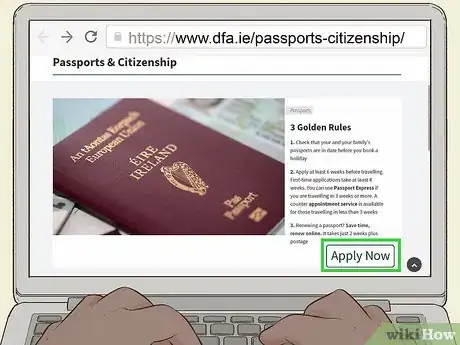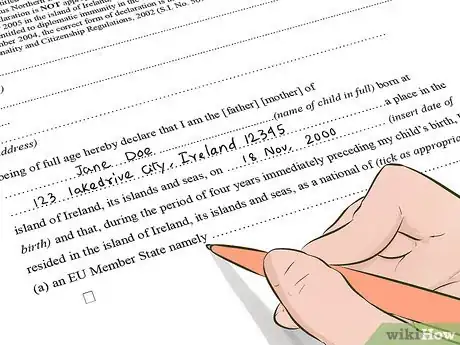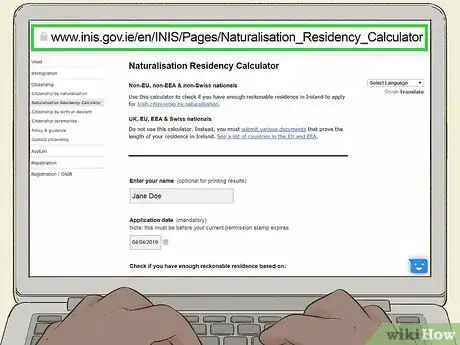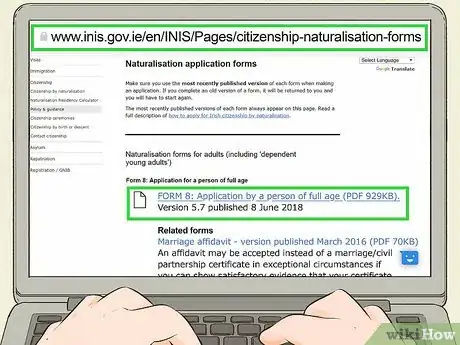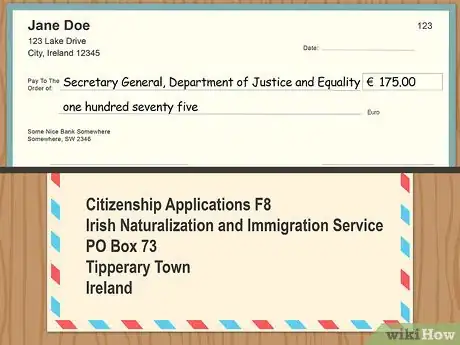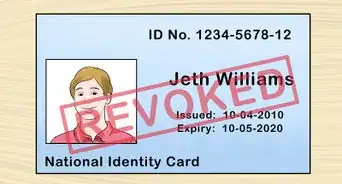This article was co-authored by wikiHow staff writer, Jennifer Mueller, JD. Jennifer Mueller is an in-house legal expert at wikiHow. Jennifer reviews, fact-checks, and evaluates wikiHow's legal content to ensure thoroughness and accuracy. She received her JD from Indiana University Maurer School of Law in 2006.
There are 9 references cited in this article, which can be found at the bottom of the page.
This article has been viewed 31,954 times.
Learn more...
You don't necessarily have to live on the island of Ireland to become an Irish citizen. Since Ireland recognizes dual citizenship, you may be eligible for Irish citizenship no matter where you live. If you were born in Ireland or have a parent or grandparent who was an Irish citizen, you may be able to claim citizenship by birth or descent. Most Irish citizens gain their citizenship this way. You may also have the opportunity to become a citizen through the naturalization process, either as a legal resident of Ireland or the spouse or civil partner of an Irish citizen.[1]
Steps
Claiming Citizenship by Birth or Descent
-
1Claim automatic citizenship if you were born in Ireland. If you were born on the island of Ireland, including Northern Ireland, before January 1, 2005, you are automatically a citizen of Ireland in most cases. All you have to do is contact the Irish Department of Foreign Affairs and Trade to apply for a passport.[2]
- There are a few exceptions to this automatic citizenship. For example, if your parents were not citizens or legal residents of Ireland, or if your parents were foreign diplomats, you typically wouldn't be eligible for automatic citizenship.
- To apply for a passport, go to https://www.dfa.ie/passports-citizenship/ and click on "Apply now."
- If you were born on the island of Ireland on or after January 1, 2005, you can also claim automatic citizenship if one of your parents is an Irish citizen, a British citizen entitled to live in Northern Ireland or elsewhere on the island without restriction, or is a legal resident who was legally present on the island of Ireland for 3 out of the 4 years before you were born.
-
2Claim automatic citizenship if your parents were Irish citizens or legal residents. Even if you weren't born on the island of Ireland, you may still be eligible for citizenship if you are descended from Irish citizens. At least one of your parents must have been born on the island of Ireland, including Northern Ireland, for you to claim automatic citizenship.[3]
- If one of your parents was born on the island of Ireland, you are most likely considered an automatic citizen. It doesn't matter where you were born. You can apply for a passport with the Irish Department of Foreign Affairs and Trade.
- Even if neither of your parents was a citizen, you may still be automatically entitled to citizenship if at least one of your parents was a legal resident of Ireland for 3 out of the 4 years before you were born.[4]
- To apply for a passport if one of your parents was a legal resident, your parents must complete a form declaring that they were legally resident in Ireland for 3 out of the 4 years before you were born. They can download the form at http://www.inis.gov.ie/en/INIS/declaration-form-a-27102016.pdf/Files/declaration-form-a-27102016.pdf.
Tip: If you were adopted, you are also entitled to automatic citizenship if at least one of your parents was a citizen or legal resident of Ireland when you were adopted.
Advertisement -
3Become a citizen by descent if one of your grandparents or great-grandparents was an Irish citizen. If one of your grandparents or great-grandparents was an Irish citizen, but neither of your parents was an Irish citizen, you may still be able to become an Irish citizen by descent. However, before you apply for a passport, you must register your birth in the Foreign Births Register. You must complete this process online.[5]
- You'll need to provide original documents proving your claim to citizenship, including birth certificates of the parents or grandparents who are or were Irish citizens. You also must provide a certified or notarized copy of the photo page of your passport or other state-issued photo identity document (such as a driver's license).
- In addition to identity documents, you must provide at least 3 documents proving your residency, such as a utility bill or correspondence from a bank or government agency.
- Go to https://fbr.dfa.ie/ to begin your application.
Tip: It may take from 6 to 12 months to process your Foreign Birth Registration application. You cannot apply for a passport until the process is complete.
Using the Naturalization Process
-
1Meet the eligibility requirements for naturalization. Generally, before you are eligible to apply for Irish citizenship through naturalization, you must be over the age of 18 and able to financially support yourself. In addition, you must also have:[6]
- Good character and a clean criminal record;
- Residence for 365 days before submitting your application;
- Residence for 4 of the 8 years preceding that year;
- A good faith intention to reside in Ireland after naturalization; and
- An intention to observe Irish law and respect its democratic values.
Tip: If you are the spouse or civil partner of an Irish citizen, some or all of these requirements may be waived, depending on the specific circumstances of your application.
-
2Calculate your reckonable period of residence. Reckonable residence refers to the periods you've legally resided in Ireland that are taken into account when your application for naturalization is examined. Generally, these periods must be properly documented with proof of your residency.[7]
- You can use the online naturalization residency calculator at http://www.inis.gov.ie/en/INIS/Pages/Naturalisation_Residency_Calculator to calculate your reckonable residence.
- You must be resident in Ireland for at least 365 days immediately preceding your application.
- Apart from the year preceding your application, Ireland doesn't require continuous presence on the island of Ireland. However, your total presence in the country must amount to at least 1,460 days out of 8 years.
Tip: If you have been in a marriage or civil partnership with an Irish citizen for at least 3 years, the reckonable residence requirement is decreased to 3 years of reckonable residence out of the past 5 years.
-
3Complete an application for naturalization. Download the most recent naturalization application from the Irish Naturalization and Immigration Service (INIS) website at http://www.inis.gov.ie/en/INIS/Pages/citizenship-naturalisation-forms. The form requires information about you, your residence in Ireland, family information, and your means of financial support.[8]
- You must answer all questions on the form fully and completely. Read the instructions carefully before you start filling out the form – they include information on how to fill out each of the questions appropriately.
- If you are basing your application on marriage or civil partnership to an Irish citizen, you must include a copy of your marriage or civil partnership certificate.
- Do not sign your application until you are with someone who can act as a witness. Check the instructions to determine who can serve as a witness.
-
4Submit your application and pay the application fee. Mail your application and supporting documents along with a bank draft for the application fee to Citizenship Applications F8, Irish Naturalization and Immigration Service, PO Box 73, Tipperary Town. As of 2019, the application fee for adult naturalization applications is €175.
- The INIS only accepts bank drafts drawn on an Irish bank. Make the draft payable to Secretary General, Department of Justice and Equality.
-
5Wait for a decision on your application. Typically, you'll receive a notification in the mail within a week letting you know that your application has been received. The INIS processes most applications within 6 months of receipt. When a decision has been made, you'll receive a notice by registered post.[9]
- If your application is approved, the notice will include information on how to apply for your certificate of naturalization and attend your citizenship ceremony.
- If your application was denied, the notice may include information on the reason for the denial and whether you have the right to request review of that decision. Keep in mind that the INIS reserves the right to deny any application, even if you meet all of the eligibility requirements. You are welcome to apply again at any time.[10]
Tip: The INIS may contact you if it needs additional information to process your application, or if you submitted incorrect or incomplete information. Respond to these queries as soon as possible to avoid additional delays in processing your application.
-
6Pay your certification fee and attend your citizenship ceremony. If your application for naturalization is accepted, you must pay a certification fee before you can receive your citizenship certificate. As of 2019, this fee is € 950. At the citizenship ceremony, you will be granted your certificate of naturalization.[11]
- The INIS only accepts bank drafts drawn on an Irish bank as payment. Your bank draft should be made payable to Secretary General, Department of Justice and Equality.
- Your citizenship is active as of the date listed on your naturalization certificate.
Tip: Citizenship ceremonies are held throughout the year. You will receive your invitation 4 to 5 weeks before the date scheduled. You must pay your certification fee before that date.
References
- ↑ https://www.citizensinformation.ie/en/moving_country/irish_citizenship/
- ↑ https://www.citizensinformation.ie/en/moving_country/irish_citizenship/irish_citizenship_through_birth_or_descent.html
- ↑ https://www.irishimmigration.ie/citizenship/check-if-you-are-an-irish-citizen-by-birth-or-descent/
- ↑ https://www.irishimmigration.ie/citizenship/check-if-you-are-an-irish-citizen-by-birth-or-descent/
- ↑ https://www.dfa.ie/passports-citizenship/citizenship/born-abroad/registering-a-foreign-birth/
- ↑ https://www.citizensinformation.ie/en/moving_country/irish_citizenship/becoming_an_irish_citizen_through_naturalisation.html
- ↑ https://www.citizensinformation.ie/en/moving_country/irish_citizenship/becoming_an_irish_citizen_through_naturalisation.html
- ↑ https://www.citizensinformation.ie/en/moving_country/irish_citizenship/becoming_an_irish_citizen_through_naturalisation.html
- ↑ https://www.citizensinformation.ie/en/moving_country/irish_citizenship/becoming_an_irish_citizen_through_naturalisation.html
- ↑ https://www.irishimmigration.ie/citizenship/become-an-irish-citizen-by-naturalisation/#refusedapplications
- ↑ https://www.irishimmigration.ie/citizenship/become-an-irish-citizen-by-naturalisation/#fees
- ↑ https://www.dfa.ie/irelanduk-citizenshipandpassports/
- ↑ https://www.citizensinformation.ie/en/moving_country/irish_citizenship/your_right_to_irish_citizenship.html
